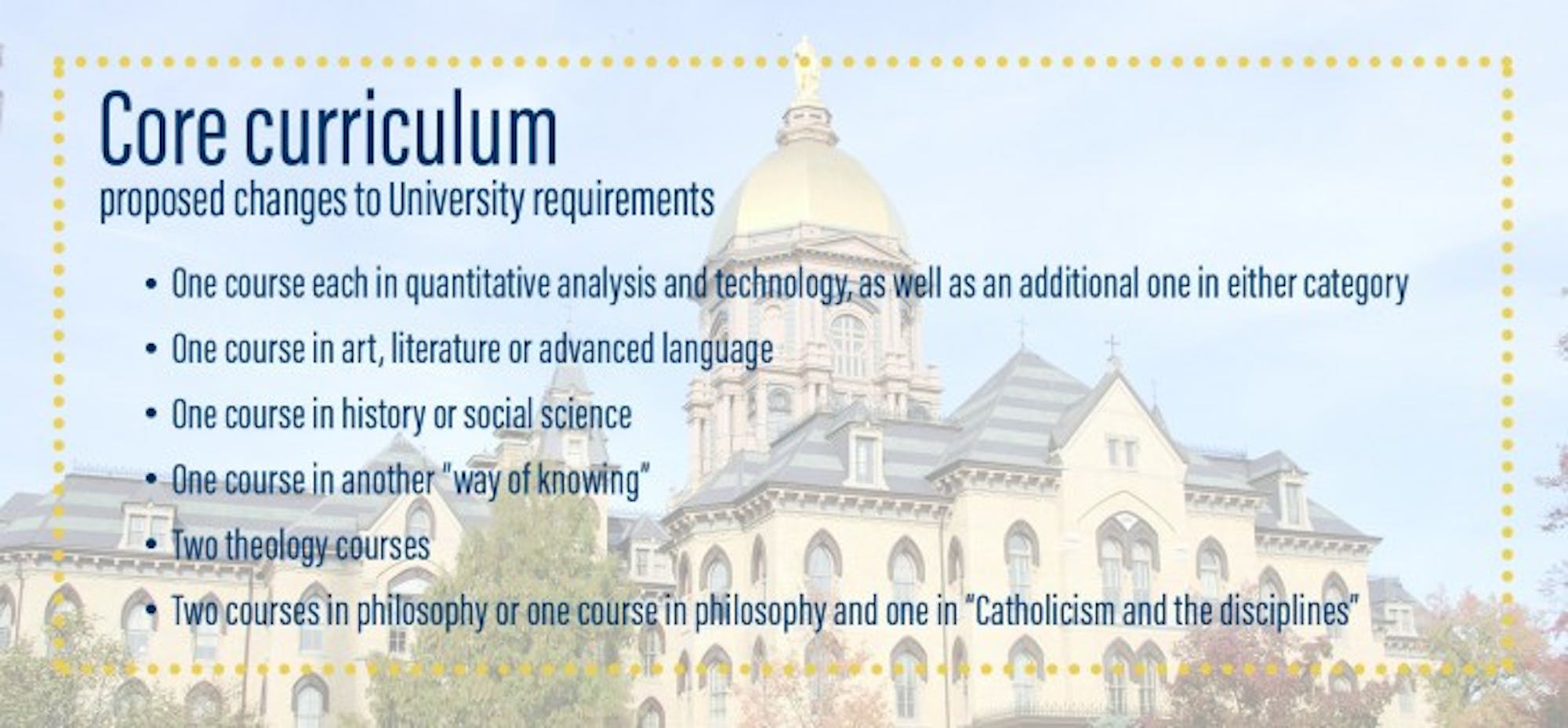The Core Curriculum Review Committee released its final report Aug. 31, after taking feedback on a draft report released last November.
The proposed changes would reduce the number of required math and science courses and modify the requirements related to the arts, humanities and social sciences. According to the report, if the changes are accepted, they will be the most significant changes to the core curriculum in more than 40 years.
In order to take effect, the Academic Council and University President Fr. John Jenkins will have to approve the proposal.
“The old requirement was two math, two science and now it’s one of each plus one more of either — so it indicates a bit of a decrease,” mathematics department chair Jeffrey Diller said. “No one likes to see their own area deemphasized. That said, there seems to be a ton of interest in math courses, requirements aside, these days. I don’t think we’re very worried about loss of enrollment or something in freshman course offerings.
“Lots of people take calculus; I think econ, in particular, has been stressing taking calculus classes even more. The practical effect of it is, in truth, probably not that large for us.”
Diller said he felt “neutral” toward the possible decrease in math classes and that his “concerns will be elsewhere,” specifically with students not being able to use AP credit to fill requirements.
“So if you got a five on the Calculus BC exam that doesn’t automatically get you out of the University math requirement — you still need to take a math course, but it could be something down the road from calc I or II,” he said. “We’ll be very concerned that the advising matches that change. It’s a shame if people who took calc I and II in high school take it again because that’s just the simplest thing to do under the circumstances. We’ll be concerned to find courses where people actually see something new.”
The report indicates that students would be required to take one class each in “quantitative reasoning” and “science and technology” and one additional course in either. Diller said the change in name could indicate an expansion in who can teach classes related to math.
“In truth, even under the old system, it was possible for another department to propose a course that would fulfill the math requirement, but there never were any proposals,” he said. “Maybe that will change now for reasons that I can’t see. Even with the change in name, there was this opportunity before to have courses offered by people other than us.”
The report also recommends requiring students to take a foundational philosophy course, but allowing a student to take a second course in philosophy or one in “Catholicism and the Disciplines” (CAD), a new category of courses that cover Catholic topics, but can be in any field.
“When taught well, philosophy courses don't just give students a body of information,” philosophy department chair Jeff Speaks said in an email. “They also teach students to form and defend their own views about the right answers to fundamental questions about the universe and themselves.
“According to the recommendation, CAD courses must have this normative dimension as well. If they really do, then I think that the proposed changes will open up some interesting opportunities for Notre Dame students. If they don't, then we will have taken a step in the wrong direction.”
Diller said the proposed changes essentially come down to how much the University requires students to step out of their specific field of study.
“Is it a good idea to make students take courses outside of their area of interest, or should we be like Brown [University], for instance, where there are basically no general requirements and people just take exactly what they want to take?” he said. “That’s somewhat above my paygrade, but I am sort of in favor in pushing people to try stuff outside of their specific area.”
In addition to advising students to take appropriate math classes, Diller said he also has concerns about flexibility in course schedules.
“This does make things somewhat more flexible for a lot of students, but not for science or engineering students,” he said. “It would be nice to see more flexibility for them. … I don’t see that the core curriculum has touched on this at all.”













